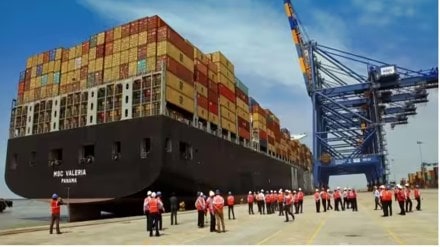Amid the growing atmosphere of confrontation and war-like situation escalating in Israel, Adani Ports and Special Economic Zone on Monday said that it is ‘fully alert’ regarding the situation at Haifa port and is taking measures to ensure safety of its employees. “At a time like this, our thoughts continue to be with the people of Israel. We are closely monitoring the action on ground which is concentrated in South Israel, whereas Haifa port is situated in the North. We have taken measures to ensure the safety of our employees and all of them are safe. We remain fully alert and prepared with a business continuity plan that will enable us to respond effectively to any eventuality,” said a spokesperson at Adani Ports and SEZ Limited.
Earlier, shares of Adani Ports fell as much as 3.6 per cent with investors growing wary over the possible escalation of the conflict in Israel where the company owns a major port. Gautam Adani operates the Haifa Port in northern Israel along with a local company after it completed its purchase for 4 billion shekels ($1.03 billion) in January.
Adani Group, however, remained confident of the business performance by APSEZ. The company spokesperson stated, “The overall contribution of Haifa in APSEZ’s numbers is relatively small at 3 per cent of the total cargo volume. For the current financial year (Apr 23-Mar 24), we have guided for Haifa Cargo volumes range of 10-12 MMT and APSEZ’s total cargo volume guidance of 370-390 MMT. In the initial six months (Apr-Sep 23), APSEZ’s total cargo volume was ~203 MMT, of which the Haifa share is ~6 MMT. We stay confident of APSEZs business performance.” Earlier in January, Gautam Adani had said that the group would continue to invest in Israel. Further, Adani Ports had earlier in the year completed the sale of its port in sanction-hit Myanmar for $30 million, significantly lower than its investment in the project.
The southern part of Israel woke up on Saturday to an ‘unprecedented infiltration’ by Palestinian militant outfit Hamas, as part of its ‘Operation Al-Aqsa Flood’. Hamas fired as many as 5,000 rockets into Israeli territory, leading Israel to order its citizens to stay indoors and issue advisories.
The impact of this conflict on businesses and sectoral performances in India is yet to be ascertained. Broadly, the businesses with Israel are confined to areas such as defence, agriculture and IT with India arguably the largest single customer for Israeli weapons systems and air-defence systems.
Meanwhile, Dr Manoranjan Sharma, Chief Economist, Infomerics Ratings, said, “The surprise Israel-Palestine war would have wide-ranging ramifications and repercussions across geographies, economies and sectors. There will be volatility in the bond and equity market temporarily. Bond yields will harden, cost of credit may go up for companies, crude price will rise if it spills over to the Middle East. Gold may become a safe haven. Bond yields will go down — as interest rates will rise further, oil prices will go further up. This would impact the Indian capital market, the banking sector, the trade deficit, the current account deficit and also to a limited extent, the fiscal deficit.”
“All this depends on the severity of the Israeli counterattack and the duration- does it end swiftly with a crippling blow to Hamas or it drags into a long-protracted war, e.g., Russia -Ukraine war?,” he added.
